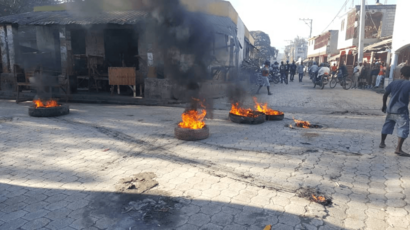Haitian crisis (2018–present) facts for kids
Quick facts for kids 2018–2024 Haitian crisis |
|||
|---|---|---|---|

Tires set on fire by protesters in Hinche, February 2019
|
|||
| Date | 7 July 2018 – present (6 years, 9 months, 2 weeks and 5 days) | ||
| Location | |||
| Caused by |
2021 phase
2022–2024 phase
|
||
| Goals | 2018–2021 phase
2022–2024 phase
|
||
| Resulted in |
|
||
| Parties to the civil conflict | |||
|
|||
| Lead figures | |||
|
|||
| Casualties | |||
| 5000+ dead, 2000+ injured, 2000+ kidnapped since 1 January 2023 360,000+ displaced as of 19 March 2024 |
|||
Protests began in cities throughout Haiti on 7 July 2018 in response to increased fuel prices. Over time, these protests evolved into demands for the resignation of Jovenel Moïse, the then-president of Haiti. Led by opposition politician Jean-Charles Moïse (no relation), protesters stated that their goals were to create a transitional government, provide social programs, and prosecute allegedly corrupt officials. From 2019 to 2021, massive protests called for the Jovenel Moïse government to resign. Moïse had come in first in the 2016 presidential election, for which voter turnout was 21%. The 2015 elections had been annulled due to fraud. On 7 February 2021, supporters of the opposition allegedly attempted a coup d'état, leading to 23 arrests, as well as clashes between protestors and police.
On 7 July 2021, Jovenel Moïse was assassinated, allegedly by a group of 28 foreign mercenaries; three of the suspected assassins were killed and 20 arrested, while a manhunt for the other gunmen, as well as for the masterminds of the attack, remains ongoing as of July 2021[update]. On 20 July 2021, Ariel Henry assumed the office of acting prime minister.
In September 2022, further protests erupted in response to rising energy prices, and a federation of gangs created a blockade around Haiti's largest fuel depot. Combined with an outbreak of cholera and widespread acute hunger, the crisis led the United Nations Security Council to impose sanctions on Jimmy Chérizier, one of the country's gang leaders. In 2022, Canada issued sanctions against three wealthy businessmen—Gilbert Bigio, Reynold Deeb, and Sherif Abdallah—whom they accused of having "participated in gross and systematic human rights violations in Haiti" as well as numerous politicians including Michel Martelly, Laurent Lamothe, Jean-Henry Céant, Joseph Lambert, and Youri Latortue. A UN report to the Security Council in October 2023 likewise identified Martelly, Deeb, and Latortue as having ties to gangs.
In March 2024, acting prime minister Henry was prevented from returning to Haiti after a trip intended to secure the help of the Kenyan police in curbing gang violence. The power vacuum, along with the chaos in the streets, led to the scheduling of an emergency CARICOM meeting on 11 March. On 11 March, Henry announced his resignation under pressure from protesters, gangs, and the international community, to be effective upon the naming of a new Prime Minister and cabinet by a transitional council.
Multinational intervention
The United States has pledged $200 million to the international police force approved by the UN and an additional $100 million in humanitarian aid. Canada announced $123 million to support Haiti, including $80.5 million for the mission. As of March 2024, the U.N. indicated that $78 million had been formally pledged, of which only $10.8 million was deposited, by Canada and France.
The US military began flying cargo planes into the Port-au-Prince airport on 23 April and by mid-May had transported over 500 tons of material, including equipment for the Haitian National Police, medical equipment, and food. On 27 May, the arrival of the first contingent of Kenyan forces, which had been rescheduled for the end of May, was again delayed.
On 26 June 2024, Kenya's first contingent of 400 elite police officers landed in Port-au-Prince's international airport after months of delay.
Images for kids
-
U.S. Ambassador to the UN Kelly Craft and President Jovenel Moïse met in November 2019 about ways to implement a consensual resolution of Haiti's political crisis.


